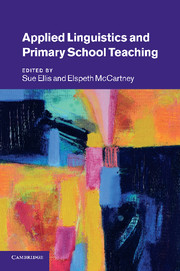Book contents
- Frontmatter
- Contents
- List of figures
- List of tables
- Notes on contributors
- Preface
- Editors' notes and conventions
- Introduction
- Part I Policy and diversity in the twenty-first-century primary school
- Part II The range and focus of applied linguistics research
- Part III Empowering teachers and teachers' use of knowledge
- Introduction to Part III
- 15 Building knowledge about language into a primary teacher education course
- 16 Using the International Phonetic Alphabet to support accurate phonics teaching
- 17 Developing word-level literacy skills in children with and without typical communication skills
- 18 The development of the Speech, Language and Communication Framework (SLCF)
- 19 How to empower teachers working with children with language impairments: why a ‘just-in-time’ model might work
- 20 Communication impairment in a multilingual context
- 21 Teacher education and applied linguistics: what needs to be understood about what, how and where beginning teachers learn
- References
- Index
15 - Building knowledge about language into a primary teacher education course
Published online by Cambridge University Press: 26 April 2011
- Frontmatter
- Contents
- List of figures
- List of tables
- Notes on contributors
- Preface
- Editors' notes and conventions
- Introduction
- Part I Policy and diversity in the twenty-first-century primary school
- Part II The range and focus of applied linguistics research
- Part III Empowering teachers and teachers' use of knowledge
- Introduction to Part III
- 15 Building knowledge about language into a primary teacher education course
- 16 Using the International Phonetic Alphabet to support accurate phonics teaching
- 17 Developing word-level literacy skills in children with and without typical communication skills
- 18 The development of the Speech, Language and Communication Framework (SLCF)
- 19 How to empower teachers working with children with language impairments: why a ‘just-in-time’ model might work
- 20 Communication impairment in a multilingual context
- 21 Teacher education and applied linguistics: what needs to be understood about what, how and where beginning teachers learn
- References
- Index
Summary
Introduction
In this chapter we set out the subject matter that student teachers encounter in the Knowledge about Language strand of the four-year BA course at the University of Brighton, UK. This course leads to Qualified Teacher Status, entitling graduates to apply for posts as probationary teachers in England's primary schools (TDA 2009c). We show how this content sits in the course as a whole and how it is related to pedagogical issues and to classroom concerns.
Wider background
It is not clear what is the relation of explicit linguistic knowledge to teachers' effectiveness as teachers of reading and writing. In the USA, despite extensive research into reading-teacher education, there is no answer. In a critical analysis published recently in Reading Research Quarterly, eighty-two empirical investigations carried out in the USA, meeting rigorous acceptability criteria, are evaluated by Victoria Risko and colleagues on the Teacher Education Task Force of the International Reading Association (Risko et al. 2008). Not one of them concerns explicit linguistic knowledge. There is one relevant study published in the UK, but it is not recent. This is the Effective Teachers of Literacy project, commissioned by England's Teacher Training Agency and carried out by a team led by David Wray and Jane Medwell at the University of Exeter over ten years ago (Medwell et al. 1998).
- Type
- Chapter
- Information
- Applied Linguistics and Primary School Teaching , pp. 203 - 215Publisher: Cambridge University PressPrint publication year: 2011
- 1
- Cited by

